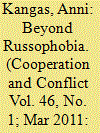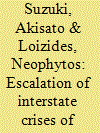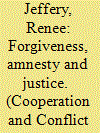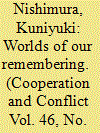|
|
|
Sort Order |
|
|
|
Items / Page
|
|
|
|
|
|
|
| Srl | Item |
| 1 |
ID:
104054


|
|
|
|
|
| Publication |
2011.
|
| Summary/Abstract |
The article offers a practice-based analysis of Finland's relationships with Russia. It works on the basis of ideas that have been presented in conjunction with the so-called practice and pragmatist turns in international relations. After identifying three key schools of thought in previous research on Finnish-Russian relations - primordialist, instrumentalist and identity-based - the article moves on to give a practice turn inspired account of the ways in which the proximity of Russia was dealt with in Finland during the inter-war period. Combining insights from the work of Pierre Bourdieu and Charles S. Peirce, it introduces a research design built with the help of such analytical tools as the doubt-belief model of social action, relational properties and fields. These tools are then applied on research materials that comprise Finnish parliamentary documents and political cartoons. The materials are argued to be particularly well suited for attempts to apply practice insights in actual research, as they simultaneously function as embodiments of meaningful patterns of social and political activity and actively correlate with the urgencies of the contexts in which they appear.
|
|
|
|
|
|
|
|
|
|
|
|
|
|
|
|
| 2 |
ID:
104053


|
|
|
|
|
| Publication |
2011.
|
| Summary/Abstract |
This article examines the causation and extent of interstate crisis escalation among two conflictual dyads, namely Greece-Turkey and India-Pakistan. It draws from the International Crisis Behaviour dataset to present a new sub-dataset of 12 interstate crises involving the two dyads in the period 1987 to 2002. While crisis behaviour in Greece-Turkey has frequently been analysed within the context of two major regional organizations (NATO and the EU), Indian-Pakistani crises have been studied within the perspective of nuclear proliferation. To examine the linkage between these features and interstate crises, the article operationalizes the security dilemma and the diversionary theory of war through a probabilistic model. Using Ragin's (2000) comparative qualitative analysis, it demonstrates that both the security dilemma and diversionary theory explain crisis escalation, although the latter covers more cases with a smaller margin of error. Moreover, the article demonstrates that Greek-Turkish crises have generally escalated to relatively low levels of conflict (threat of war or show of force), while Indian-Pakistani crises have spiralled to higher levels of confrontation (use of force). In both dyads, nuclear weapons and regional organizations have shaped the boundaries of possible escalatory action. The EU and NATO have contributed to mitigating crisis escalation and the use of force between the Aegean neighbours, while unintentionally encouraging low intensity confrontations; meanwhile, in South Asia, nuclear weapons in combination with fragile domestic regimes have exacerbated crises, particularly in the form of state-sponsored unconventional warfare.
|
|
|
|
|
|
|
|
|
|
|
|
|
|
|
|
| 3 |
ID:
104058


|
|
|
|
|
| Publication |
2011.
|
| Summary/Abstract |
The practice of forgiveness in processes of conflict resolution and post-conflict justice is confronted by two sets of serious criticisms. First, scholars and practitioners alike have questioned whether or not the fundamentally interpersonal practice of forgiveness can be readily and legitimately transposed to broader socio-political contexts. Second, questions have also been raised concerning the potential for forgiveness, particularly when associated with amnesties, to jeopardize and even circumvent the application of justice in post-conflict contexts. By contrast, supporters argue that forgiveness is not only possible but necessary in politics and, by drawing a distinction between amnesties and forgiveness, and restorative and retributive forms of justice, that forgiveness contributes to the achievement of restorative justice. By analysing the role that forgiveness is playing in bringing almost two decades of conflict between the Lord's Resistance Army and the Ugandan government to an end, this article demonstrates that a disjuncture exists between the theoretical treatment of forgiveness and the practice of political forgiveness. That is, it demonstrates, contrary to arguments made by both its supporters and critics, that political forgiveness, even when conceived in conjunction with amnesties, may contribute to both restorative and retributive forms of justice.
|
|
|
|
|
|
|
|
|
|
|
|
|
|
|
|
| 4 |
ID:
104056


|
|
|
|
|
| Publication |
2011.
|
| Summary/Abstract |
This article examines how geopolitical shifts and the potential emergence of either a bipolar or multipolar system will affect the transatlantic relationship and a small state on the margins of power centres. A more Asia-centred world and a new polarity could drive a wedge into the transatlantic relationship. It is therefore explored how the US and the EU can develop hedging and risk management strategies that are complementary and take into account diverging capabilities, political structures, different threat perceptions of China and the effects of a potential new polarity. It is also noted that Norway will need a sophisticated foreign policy if it wants to approach the EU's position related to China, while simultaneously sustaining close relations with a US that is becoming more preoccupied with China and continues to shift more of its resources towards Asia. A hedging strategy can guide Norwegian policy-makers to meet such challenges.
|
|
|
|
|
|
|
|
|
|
|
|
|
|
|
|
| 5 |
ID:
104051


|
|
|
|
|
| Publication |
2011.
|
| Summary/Abstract |
Most NATO countries reformed their defence systems during the 1990s in response to the end of the Cold War. Although Norway adjusted to new external framework conditions and participated in the new international operations, territorial defence dominated the defence discourse and military practices at home into the next millennium. This article argues that the continuity in the discourse and the pace with which defence reform has been implemented during the period 1990-2005 is a result of social factors and relations at the national level. First, the nation-building role of the Norwegian defence system has shaped central national concepts, values and military practices, rendering it resistant to change. Second, reform has been counteracted by the weight of the military institution - in terms of size, geographical extent and deep-rooted practices related to training and education. Third, Norwegian defence policy is deeply intertwined with other domestic policy areas, so when changes in the defence establishment have negative consequences, especially for district policy, opposition is provoked. In contrast, the Norwegian defence discourse and practices seem to have rapidly co-opted the changes invoked by the emerging multi-polar system. This underscores the claim made here, that the Norwegian defence discourse is largely about national, territorial defence.
|
|
|
|
|
|
|
|
|
|
|
|
|
|
|
|
| 6 |
ID:
104060


|
|
|
|
|
| Publication |
2011.
|
| Summary/Abstract |
Attempts to deal with the agent-structure problem have often resulted in the introduction of alternative forms of structuralism. Scholars have thus failed to observe the construction and reconstruction of subjectivity, which occurs as an eternal process because of the simple fact that each of us lives in his or her own time. This article attempts to provide an alternative approach to the agent-structure problem by reformulating it as an issue of identity. Especially in comparison with Lévinas, Ricoeur's thought of memory proves helpful in grappling with the problem, not by presupposing the coherent entity of either agent or structure, but by directing our attention to the in-between. It also enables a nuanced analysis of social change, which always needs to be comprehended in its tension with the leanings toward stability. A brief analysis of the literary discourses after the Great War illustrates this point. As a whole, the article aims to recover beings' temporality at the centre of the agent-structure problem and thus reconstruct the problem as innately unstable agents' search for their constantly changing identity.
|
|
|
|
|
|
|
|
|
|
|
|
|
|
|
|
|
|
|
|
|